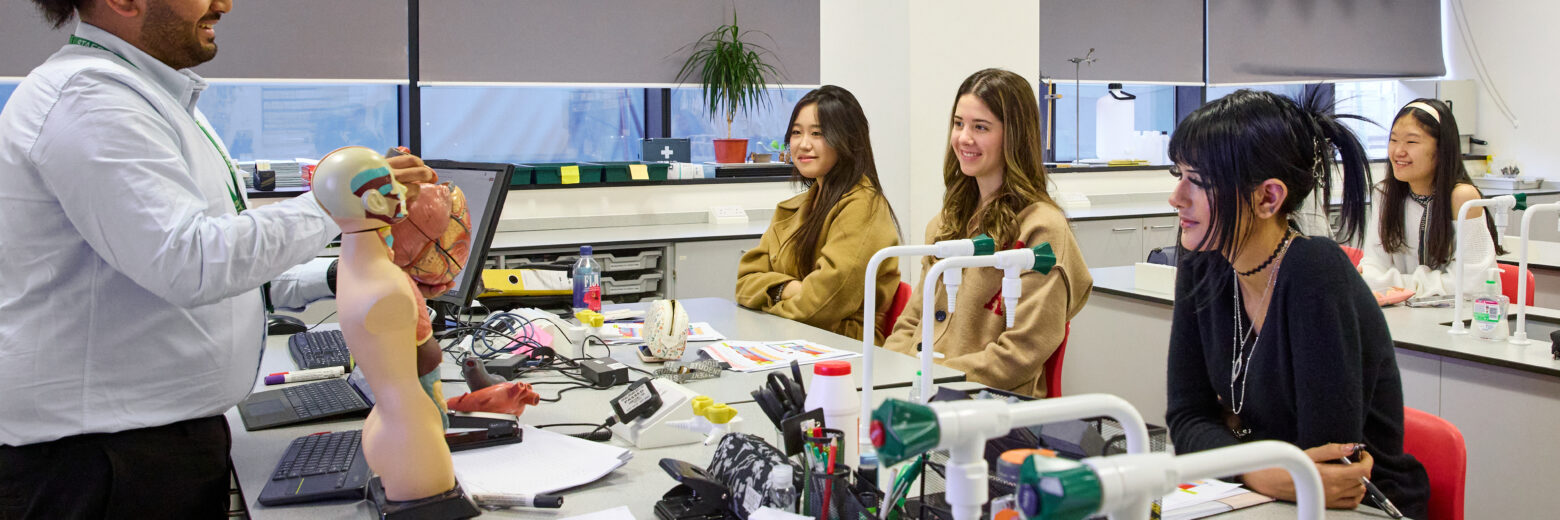BIOLOGY
Biology involves the study of a wide range of exciting topics; from molecular biology to the study of ecosystems and from micro-organisms to mammals.
WHAT IS BIOLOGY?
Historically, what were the two main evolutionary theories?
What is brainfreeze?
How do painkillers work?
Why do our stomachs rumble?
How do our bodies maintain a constant temperature?
How does a fish breathe underwater?
Biology is considered to be the science of life and living things. Our fascination with biology has a long history. Even early humans had to study the animals that they hunted and know where to find the plants that they gathered for food. These days Biology is a more complex subject, but with its mixture of scientific method, problem solving, practical skills and socially relevant content, it allows students to think critically about ideas and develop essential skills in interpretation and application.
WHAT IS BIOLOGY AT DLD?
A Level Biology is taught through a combination of practical and theory sessions, using interactive materials to bring up-to-the minute information into lessons.
Students starting Year 1 of the A Level Biology course will be following the OCR Biology A linear specification.
The modules are:
| Module | |
| Both years | 1: Development of practical skills in biology |
| Year 1 | 2: Foundations in biology 3: Exchange and transport 4: Biodiversity, evolution and disease |
| Year 2 | 5: Communication, homeostasis and energy 6: Genetics, evolution and ecosystems |
Students take progression exams at the end of Year 1, and subject to a suitable pass grade, can move into Year 2.
In addition to these courses, any student applying for Medicine, Veterinary Medicine or Dentistry has the opportunity to join ‘Medsoc’, which helps to prepare students for all aspects of their application.
HOW IS BIOLOGY AT DLD ASSESSED?
Exam Board: OCR (A)
| Paper | Modules | Weighting | Length | |
| 1 | 1,2,3 and 5 | Section A – multiple choice questions (15 marks) Section B – short answer questions including extended response (85 marks) | 37% | 2h 15 min |
| 2 | 1,2,4 and 6 | Section A – multiple choice questions (15 marks) Section B – short answer questions including extended response (85 marks) | 37% | 2h 15 min |
| 3 | 1-6 | Short answer questions including extended response (70 marks) | 26% | 1h 30 min |
WHAT DO I NEED TO STUDY BIOLOGY AT DLD?
A Level Biology requires an interest in the subject and an enthusiasm and commitment to work hard. You will need to develop your abilities to work independently and take responsibility for your own progress. Ideally, you will have at least a B grade (level 6) in GCSE science (double or separate sciences) and mathematics; although we have worked with students from a variety of backgrounds and experience.
GOOD SUBJECT COMBINATIONS
A Level Biology is one of the most popular subjects in the country, attracting students taking a wide variety of other subjects. A Level Biology is often chosen alongside another science and/or Maths and Computer Science. Geography is another popular choice, as there is overlap with the areas of ecology and physical geography. However, Biology works as a “standalone” science, and attracts students taking subjects as diverse as Art, Psychology, Sociology and Music.
WHAT DO I DO AFTER DLD?
Many students go on to a biologically-related degree course such as Medicine, Dentistry, Veterinary Science, Physiotherapy, Pharmacy, Optometry, Nursing, Marine Biology, Zoology or Forensic Science. Biotechnology and pharmacology are growing industries employing many Biology graduates. Biologists are vitally important in such areas as food production, ecology and cell biology. Others choose careers as diverse as law, computing, accounting or teaching. The skills of experimentation, logical analysis and evaluation learned in Biology have uses that transcend subject boundaries and are helpful in many career areas.
ENTRY REQUIREMENTS ON BIOLOGY FOR INTERNATIONAL STUDENTS
To study A Levels, your current or pending exam results should be equivalent to or higher than GCSE (General Certificate of Secondary Education) in at least 5 subjects and a minimum level of English equivalent to IELTS 5.5.
At the start of each academic year of study students following an A Level course without a pass at Level 5/Grade C in GCSE or IGCSE English Language or with an Academic English score below 6.5 overall must join an Academic English training course for the duration of the academic year which will be timetabled alongside A Level lessons.
If your level of English is not sufficient to meet the entry criteria for the A Level programme you will normally be offered a place on the one year Academic Preparation Course (pre A Level) in order to bring your English skills up to the required level.



